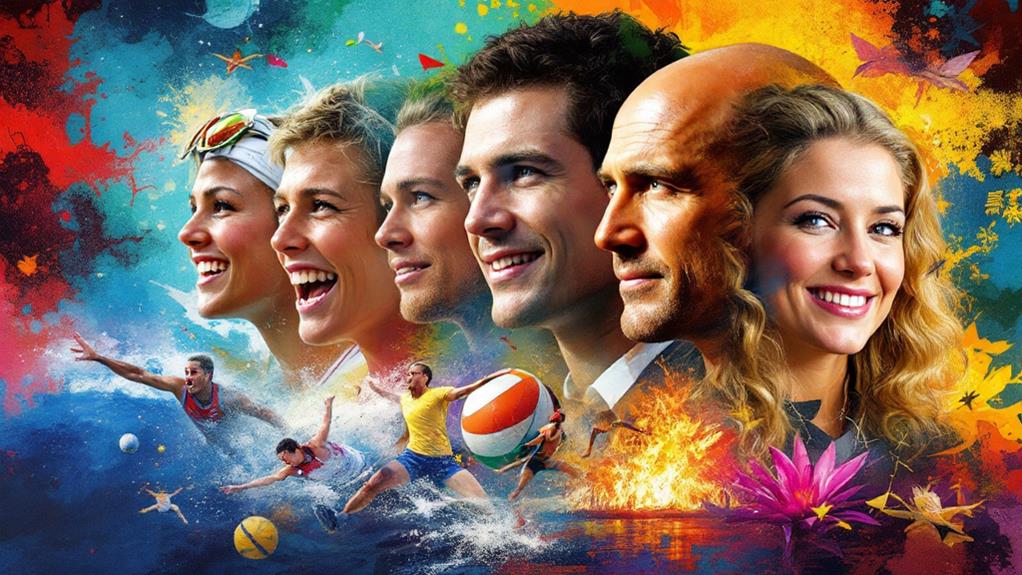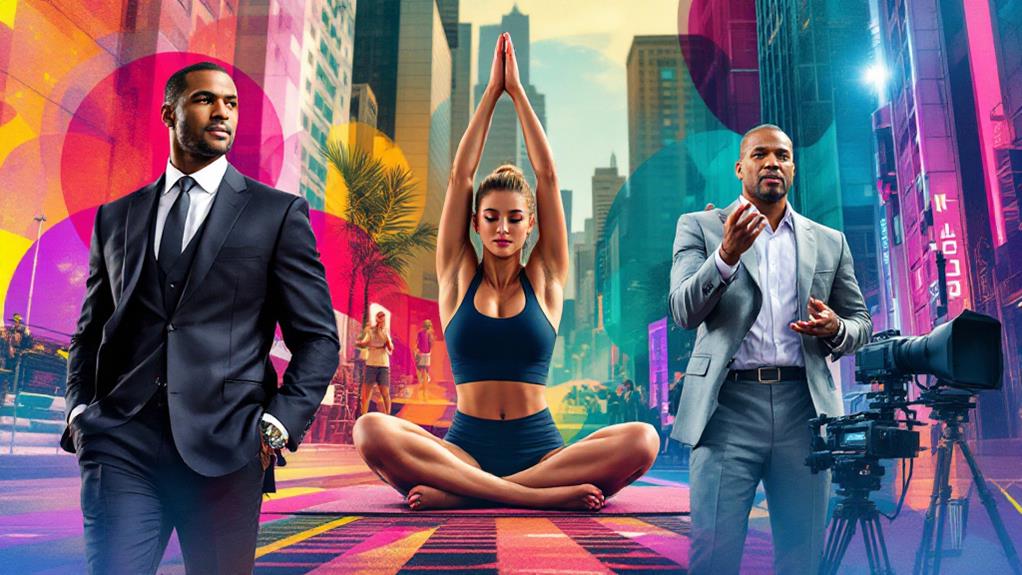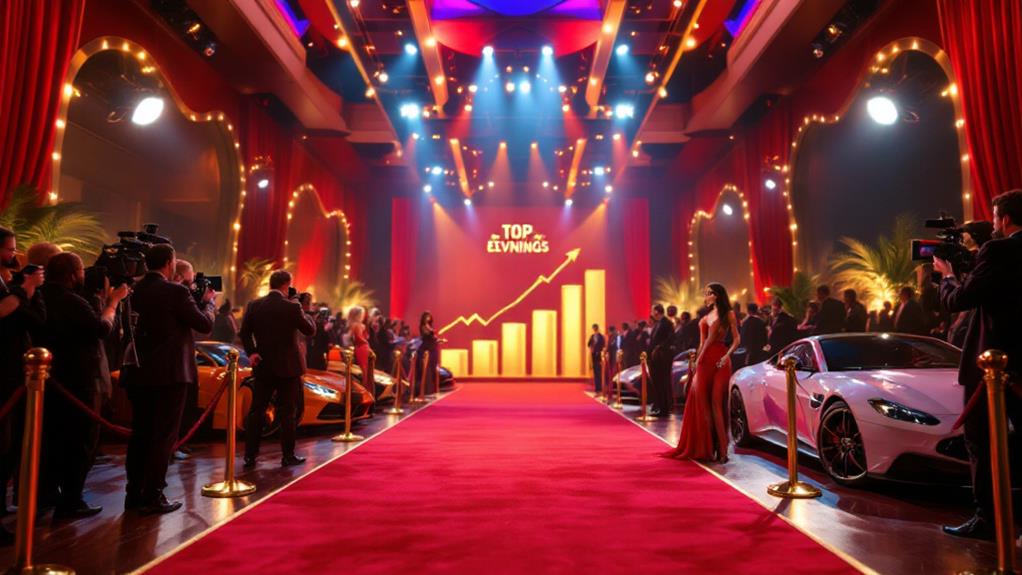The World's Highest Paid Athletes in 2000: Where Are They Now?

You're curious about the top-earning athletes from 2000 and where their paths have led since then. Tiger Woods is designing golf courses and maintaining lucrative endorsements. Michael Jordan transformed sports branding with Air Jordan and continues to earn through diverse ventures. Mike Tyson found new success with a podcast and cannabis business. Shaquille O'Neal shifted into media and business with restaurant franchises. Many continued shaping cultural landscapes through philanthropic pursuits, like Tiger's educational foundation and Michael's community support. These athletes have turned their sports fame into enduring legacies. To uncover more of their stories, keep exploring their incredible odyssey.
Top Athletes of 2000
In 2000, the sports world witnessed significant financial success, with Tiger Woods leading the pack as the highest-paid athlete. You might recall that Woods, the golfing sensation, earned an incredible $60 million that year, thanks to a combination of endorsements and tournament winnings. His dominance on the golf course translated into substantial financial rewards, setting a high bar for other athletes.
Close on his heels was basketball legend Michael Jordan. Despite retiring from the NBA for the second time in 1999, Jordan remained a financial powerhouse, bringing in around $32 million. His lucrative Nike contract and numerous endorsements kept him firmly in the spotlight and second among the top earners.
Boxing's Mike Tyson wasn't far behind. Tyson managed to secure around $30 million despite his well-documented financial troubles. Football's Peyton Manning also made the list, pulling in $28 million through his NFL salary and endorsement deals. Manning's impressive earnings solidified his status among the top five highest-paid athletes.
Last but not least, tennis champion Andre Agassi earned $25 million. His on-court successes paired with endorsement agreements placed him among the elite group of top-earning athletes in 2000.
Earnings and Endorsements
Alongside their on-field prowess, athletes in 2000 capitalized on lucrative endorsement deals, markedly enhancing their earnings. The highest-paid athlete that year, Tiger Woods, amassed approximately $87 million, largely thanks to endorsements with giants like Nike and Gatorade, beyond his substantial tournament prize money. Michael Jordan, another top earner, brought in around $60 million, primarily driven by his enduring Nike endorsement and the iconic Air Jordan line. Meanwhile, Floyd Mayweather Jr. pocketed about $30 million, blending his boxing match earnings with strategic endorsements, which solidified his reputation in sports marketing.
Consider these highlights:
- Tiger Woods: Dominated earnings through tournament wins and brand deals.
- Michael Jordan: Continued to cash in on the Air Jordan legacy.
- Floyd Mayweather: Mixed boxing winnings with savvy endorsements.
- David Beckham: Garnered $29 million from soccer salary and endorsements like Pepsi.
- Endorsements' Impact: Showcased the critical role of brand partnerships in athlete earnings.
David Beckham, another notable figure, earned approximately $29 million, with a significant portion stemming from endorsements with Pepsi and Adidas. The collective earnings of these athletes emphasized how endorsements could substantially enhance income, surpassing traditional salary and prize money. Athletes in 2000 showcased the burgeoning influence of brand partnerships in amplifying their financial success.
Post-Sports Careers

Having secured their places among the top earners in sports through strategic endorsements and remarkable performances, many athletes from 2000 have since ventured into impressive post-sports careers. Michael Jordan, for instance, transformed his endorsement deal with Nike into a multi-billion-dollar brand with Air Jordan sneakers. His seamless shift illustrates how the highest-paid athletes can capitalize on their fame post-retirement.
Tiger Woods continues to earn considerably through golf course design and different endorsement deals, proving that appearance fees and strategic partnerships can sustain an athlete's financial success even after their career peak. Meanwhile, Mike Tyson has reinvented himself through ventures like a successful podcast and a burgeoning cannabis business, demonstrating resilience and adaptability.
Shaquille O'Neal has become a notable media personality, plunging into entertainment through acting, sports commentary, and other ventures. His shift exemplifies how former athletes can utilize their charisma into new arenas. On the other hand, Allen Iverson faced financial challenges post-retirement, yet he still maintains influence in the sport through endorsement opportunities and basketball-related events. His expedition underscores the importance of diversifying one's post-sports pursuits to overcome financial hurdles.
Business Ventures
The world of business offers a lucrative avenue for retired athletes looking to capitalize on their fame and fortune. As a highest-paid athlete in 2000, Michael Jordan not only dominated basketball but also left a lasting mark in business ventures. His collaboration with Nike birthed the Air Jordan line, a brand that remains a top seller globally. Likewise, boxer Floyd Mayweather Jr. utilized his fame to promote his own fights and launch The Money Team, a brand that spans multiple interests, including clothing and sports management.
Meanwhile, Shaquille O'Neal, another high earner from 2000, ventured into a range of business opportunities. From owning restaurant franchises to investing in tech startups, Shaq's business acumen is evident. Furthermore, his role as a television personality has further solidified his post-basketball career. Here's a quick look at some of these athletes' ventures:
- Michael Jordan: Air Jordan line with Nike
- Floyd Mayweather Jr.: The Money Team enterprise
- Shaquille O'Neal: Restaurant franchises and tech startups
- Tiger Woods: Golf course design and TaylorMade partnership
- Allen Iverson: Brand partnerships and sports management
These athletes have successfully converted their sports success into thriving business ventures.
Philanthropy and Community
While athletes often channel their competitive spirit into business ventures, many also recognize the power of using their influence for positive change. You see this in the philanthropic efforts of the highest-paid athletes from 2000. Take Michael Jordan, for instance. Through his Jordan Brand, millions have been contributed via the "Jordan Brand Wings" program, which offers scholarships and resources to students in underserved communities, focusing on education and creating opportunities for youth.
Tiger Woods has been similarly impactful, having founded the Tiger Woods Foundation. This organization has raised over $100 million, with a strong emphasis on education. Programs like the Earl Woods Scholar Program are designed to provide opportunities and support for underserved youth, helping them achieve academic success.
Floyd Mayweather Jr., often seen as extravagant, has also made significant contributions. His support extends to youth programs and disaster relief efforts, underscoring his commitment to giving back to the community. Meanwhile, Serena Williams has directed her efforts toward gender equality and racial justice, donating to organizations that empower women and communities of color. Her work guarantees that the fight for equality and justice continues, making a profound impact.
Lasting Legacy
Legacy, a term often associated with the enduring impact of individuals, captures the essence of what the highest-paid athletes of 2000 have left behind. Michael Jordan's $80 million earnings, mostly from endorsements, established him as a global sports icon and set a new standard for athlete branding. His influence in brand management and financial success continues to inspire athletes today. Tiger Woods, with $65 million, has not only made a remarkable comeback in golf but also transformed athlete endorsements with his enduring brand.
Kobe Bryant, with his $27 million earnings, left a lasting legacy in basketball culture. His "Mamba Mentality" and philanthropic efforts continue to inspire countless individuals. Floyd Mayweather Jr., earning $50 million, remains a boxing legend whose strategic business choices and unbeaten record underscore his lasting legacy.
These athletes have shown future generations the potential for success beyond the field, combining athletic prowess with savvy marketing and brand management.
- Michael Jordan's endorsements changed athlete branding.
- Tiger Woods' influence in golf and endorsements is unparalleled.
- Kobe Bryant's legacy extends through culture and philanthropy.
- Floyd Mayweather's business acumen improves his boxing legend.
- Their financial success sets benchmarks for future athletes.




